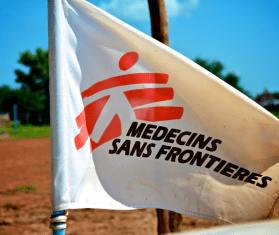Thousands of Palestinians are trapped in Jabalia camp, northern Gaza, as Israeli forces attack the area. “Nobody is allowed to get in or out—anyone who tries is getting shot,” says Sarah Vuylsteke, a project coordinator for Doctors Without Borders/Médecins Sans Frontières (MSF). Five MSF staff are trapped in the camp, fearing for their lives.
“We were staying at the Al-Yemen Al-Saeed Hospital, but they bombed it,” says Haydar, an MSF driver trapped in Jabalia camp. About 20 people were killed. I don’t know what to do, at any moment we could die. People are starving. I am afraid to stay, and I am also afraid to leave.”
Israeli forces issued evacuation orders for Jabalia camp on October 7, while carrying out attacks at the same time, preventing people from leaving the area safely. Forced evacuations of homes and the bombing of neighborhoods by Israeli forces are turning northern Gaza into uninhabitable ruins.
MSF calls on Israeli forces to halt forced displacements and to stop the all-out war on the people of Gaza. Israeli forces must also ensure the protection of civilians and hospitals and allow desperately needed humanitarian supplies to enter the north as a matter of extreme urgency.
More from MSF driver Haydar:
"On the night of October 6, there were sounds of bombing and clashes. Things got very serious. We were very scared. Day by day, things escalated. In the end, we decided to leave. We found that the situation was difficult, and that Jabalia camp was besieged. We couldn't get out, so we stayed in the Yemen Alsae’d Hospital. On the October 9, Israeli forces bombed the Yemeni hospital and set the tents on fire. More than 20 people were killed in the strike and others were injured. I have six children, my son has six children—one of whom died. I am here now. I don't know what to do; I have no choice. I am worried, anxious, very angry, and afraid of the terror we are living in. At any moment, I could die. I could get hurt, or my family, and we could all die.
"My wife needs a wheelchair; it's very difficult for her to move, and she is sick. Even if I want to move, it is difficult for me to move. People are starving; there is no food, no water, and no drinking water. I am afraid to stay, and I am afraid to [leave]. Every place in the north is subject to these dangers; every place is at risk. There isn’t a single safe place at all. I don't know how to describe these feelings—they are mixed with terror, tears, and holding the young children as they cry witnessing these hardships."




